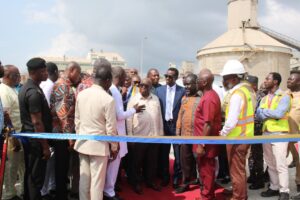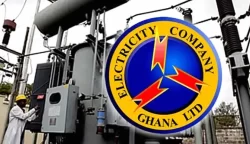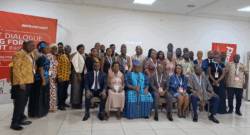…as Prez inaugurates container terminals, dry dock
President Nana Addo Dankwa Akufo-Addo, yesterday, inaugurated a new state-of-the-art Dry Bulk Terminal and the Atlantic Terminal Services Multi-purpose Container Terminal as well as the Prime Meridian Dock Company’s Floating Dry-dock at the Takoradi Harbour in the Western Region.
The President also cut the sod for work to commence on the construction of a US$98million modern oil and gas services terminal “as part of the strategic development of the Port of Takoradi to service the emerging Petroleum Hub and accommodate oil and gas service providers, fabrication companies, exploration companies and their suppliers for supply base activities”.
The floating dry-dock and ship maintenance facility, which is being introduced in partnership with a wholly-owned Ghanaian company, Prime Meridian Dock Limited (PMD), according to him, “estimated at US$137million, is being financed by Prime Meridian Docks Limited. This initiative is meant to carry out maintenance works on vessels which, otherwise, would have had to call at Las Palmas, Carina, and other ship repair facilities in other countries for maintenance works”.
These projects, the President pointed out, “will enhance cargo handling capacity, maintenance and repairs of ships, and also meet the demands of the rigours of the oil and gas service sector within the Takoradi Port enclave”.
Completed at a total cost of US$85million, the Dry Bulk Terminal, the President said, “has been equipped with modern ship loaders and eco-hoppers for the safety of both workers and members of the port community”.
The new US$250million ATS Container Terminal facility, which is part of the multi-purpose terminal “will take care of both export and import containers and conventional cargoes. Operationalisation of this facility is expected to begin in February 2023 as the port prepares to accommodate increased demand in cargo trans-shipments and local deliveries”, he continued.
The terminal, is the largest single investment made by a wholly-owned firm, Ibistek Ghana, since the operationalisation of the port in 1921. The completion of works on the phase one of the Atlantic Terminal Services Limited (ATSL) has increased the port’s berthing capacity from the 10-metre draught (draft/depth) to minus 16-metre dart, with the quay wall – a retaining structure at which ships can berth – extending to 600 metre-long.
The project, under a concession agreement with the Ghana Ports and Harbours Authority (GPHA), was financed by the African Finance Group of Nigeria and the Ghana Infrastructure Investment Fund (GIIF).
The new terminal covers a land space of 10 hectares and has an operational area of 160 metres capable of holding 8000 to 9000 Twenty Equivalent Units (TEUs), including a holding area for refrigerated imports.

Ibistek, has over the past six years, invested about US$322.7million in the Takoradi Port alone from the development of an off-dock terminal, Takoradi Container Terminal Limited (TACOTEL), which has a holding capacity of 7,500 TUEs, scaling up cargo throughput at the port from 24,898 Twenty Equipment Units (TEU’s) in 2017 to 48,128 TEU’s at the end of 2019.
Ibistek, through its special purpose vehicle – Marshall Oil and Gas Services Limited, also presently operates a US$56million oil jetty facility with a capacity of discharging some 80,000 tonnes of oil per stream day at the port, phasing out the dilapidated jetty previously operated by GPHA at a 20,000 tonnes capacity.
President Nana Addo Dankwa Akufo-Addo noted that the four interventions will enhance cargo handling capacity, maintenance and repair of ships, and also meet the demands of the oil and gas sector within the Takoradi Port enclave.
He explained that the objective of the expansion and transformation of the Takoradi Port by the government is to help boost the Ghanaian economy while boosting regional and international trade.
According to him, government is determined to improve maritime trade and position it as a major economic growth engine. “Takoradi Port, has over the years, been the preserve of cargo exported out of the country while Tema Port has been the preserve of cargo imported into the country. So the Takoradi Port has been an export-oriented port. But my government has never been a believer of this notion,” he added.
The President said government has worked hard to modernise and diversify the Takoradi Port’s reliance on the export of raw materials, including bauxite and manganese, which have never yielded high value returns to the country.
Transport Minister Kweku Ofori Asiamah commended the President for his resolve in ensuring that the various components in the Takoradi Port expansion are executed since his government came to power.
Western Regional Minister Kwabena Okyere Darko-Mensah said these projects will propel economic activities at the port. He said all these projects will create more jobs for the youth in the region and the country at large.
Chief Executive Officer of Ibistek, Dr. Felix Nana Sackey, said the project will be significant in contributing to the continuing growth of trans-shipment trade through Ghana.
“We have seen some significant changes in the supply chain and trading patterns due to COVID-19, and we hope a successful commencement of operations will deliver the capacity businesses need to export products from Ghana to other parts of the world,” he said.
Chairman and Director of Ibestek Limited, Lawyer Kwame Gyan, explained that ATSL had been developed by Ibistek Limited, a wholly-owned Ghanaian company, in partnership with GPHA and AFC Equity with financial support from the Ghana Infrastructure Investment Fund (GIIF), Africa Finance Corporation (AFC) and ACCESS Bank.

The projects
Dry Bulk Terminal
The Dry Bulk Terminal (DBT) has been developed for the handling of manganese, bauxite, limestone, gymsum, quicklime, iron ore, alumina, petroleum cokes, fertiliser, among others. The terminal has been designed to handle, at least, 30million tonnes of cargo per annum. The current set-up of equipment can deliver 20 million tonnes per annum, which is a significant increase over the existing throughput which has averaged 6.3 million tonnes per annum.
The project comprises of main terminal superstructure facilities, more than 110,000 square metres of pavement, over 3,000 metres of drains, 33-kiloVolts primary sub-station and electrical power systems, terminal lighting and water storage systems, crane rails for the main loading and unloading equipment, and a fully-furnished operations office building with Information Technology (I.T.) backbone for the operations of the terminal.
The project has also provided fully-automated conveyor systems for the main cargo groups which are bauxite, manganese, and clinker (to GHACEM), two modern shiploaders for the handling of export cargo (bauxite and manganese) and an eco-hopper for the imports.
Furthermore, the stockpile yards for manganese and bauxite are aligned to deliver their respective cargo into designated hopper bins for the materials to be transferred directly to vessels. Manganese and bauxite stockpile areas can each hold, at least, 130,000 tonnes of cargo. Additionally, design loading speed is 2,500 tonnes per hour, compared with the pre-project delivery of less than 400 tonnes per hour.
Significantly, four more eco-hoppers are expected in the next few months to complete the full set-up of the terminal. Ultimately, these eco-hoppers will be installed and fitted to significantly reduce (or completely remove) dusty emissions during cargo operations.
The project component being commissioned is worth US$86million, and is also a terminal space of 9.8 hectares (98,000 square metres) fitted with civil engineering terminal facilities and utility services for container terminal operations. Crane rails have been provided in anticipation of the most modern ship-to-shore (STS) container handling cranes.
Atlantic Terminal Services
The container terminal development is part of the container and multi-purpose terminal concession partnership between GPHA, IbisTek Limited, and AFC-Equity of the Africa Finance Corporation.
The terminal developed now presents a 600 metre quay wall at -16m water depth along the berths. There is also a terminal space of 9.8 hectares (98,000) square metres fitted with civil engineering terminal facilities and utilities services for container terminal operations.
Crane rails have been provided in anticipation of the most modern ship-to-ship (STS) container handling cranes.
The oil and gas services terminal to be developed will provide 21 hectares of serviced terminal area.
Oil and gas services terminal
The oil and gas services terminal to be developed will provide 21 hectares of serviced terminal area and a 550-metre primary quay wall facility. The quay area will provide -10m water depth at berths and 40-metre quay apron for terminal operations.
The serviced terminal area is being developed to accommodate oil and gas services providers, fabrication companies, exploration company partners and their suppliers for supply base activities. Total project cost is approximately US$98million to be completed on September 2024.
Prime Meridian Docks
The Prime Meridian Docks Ghana Limited is a private Ghanaian company that is developing a floating dry dock facility for ship and rig repairs in the Port of Takoradi. The project comprises civil works and the procurement of a floating dry dock. The civil works involve the dredging of a pocket for the floating dock and the turning basin to -14m and -11m respectively, the construction of a jetty of 200 metres, a fitting-out quay facility that provides up to 400 metres of berthing space, and the development of some 18,000 square metres of lay-down area and land-based workshop facility.
A 13,500-tonne lift capacity floating dry dock will be newly constructed and will be capable of servicing ships of 200 metres (LOA).
This phase of the project is estimated at US$137million, funded by PMD, private equity investors and development finance institutions. The shipyard facility is expected to be operational in the fourth quarter of 2024.










